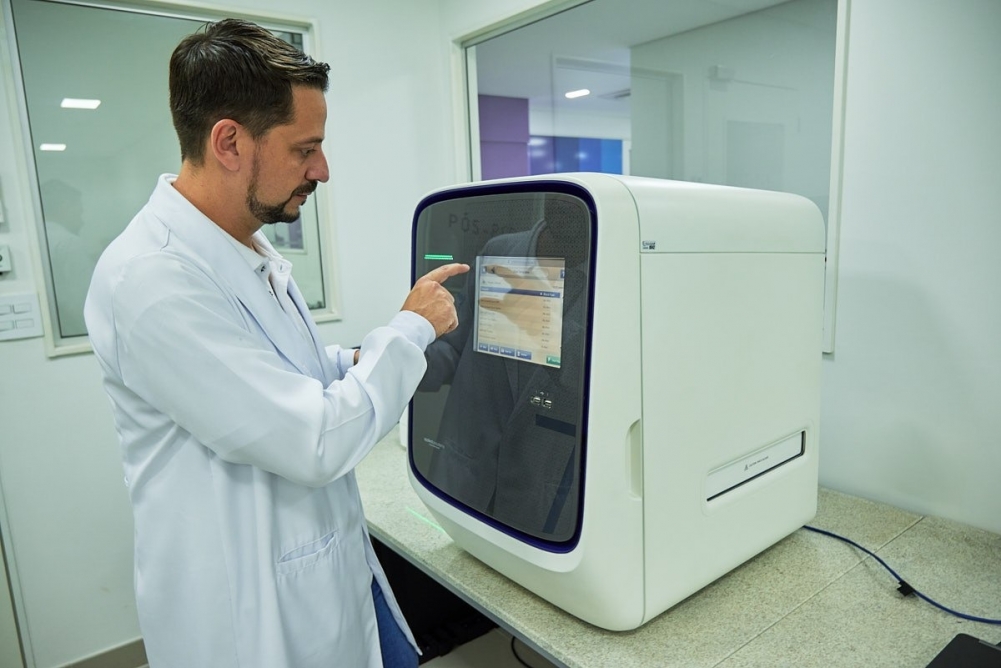


Marcos Tadeu dos Santos, founder and CEO of Onkos; photo: personal archive
Published on 09/04/2023
Agência FAPESP – A project that led to the development of a thyroid tumor diagnostic and prognostic test was one of the winners of the 14th Octavio Frias de Oliveira Awards. The announcement was made on August 11 at a ceremony hosted by the São Paulo State Cancer Institute (ICESP) and Folha de S. Paulo newspaper.
The technology developed by Onkos Diagnósticos Moleculares, a startup supported by the FAPESP Innovative Research in Small Business Program (PIPE), lets patients and the health system avoid the unnecessary surgical removal of the gland performed when the traditional diagnostic method gives an “indeterminate” result, in which case thyroidectomy is carried out as a precaution.
According to Marcos Tadeu dos Santos, founder and CEO of Onkos, the vast majority of nodules are benign, but as many as 30% are classified as indeterminate, and in these cases, the standard procedure is surgical removal of all or part of the thyroid as a precaution. However, only 25% of nodules are malignant, which means that 75% of the thyroidectomies performed to remove indeterminate nodules are potentially unnecessary (read more at: pesquisaparainovacao.fapesp.br/2074).
The numbers resulted from a clinical trial in which 435 patients were followed up for two years after taking the test in all regions of Brazil. An article published in the journal eBioMedicine states that 74.6% of “potentially unnecessary” surgeries were avoided and the test altered the clinical conduct of physicians in 92.3% of cases.
“The award not only recognizes the quality of our work but also reflects a change of attitude toward research in the private sector in Brazil,” Santos told Agência FAPESP. “The fact that an institution as prestigious and time-honored as ICESP values research conducted in the private sector and recognizes its scientific value to society and patients is positive. It shows progress in how research done by companies is seen.”
Onkos was supported by PIPE in different stages of the product development process. Phase 1 funding supported development of the diagnostic part. Phase 2 involved development of prognostic markers to gauge the aggressiveness of malignant nodules. Phase 3 focused on commercialization and marketing: a professional was hired to conduct a cost-effectiveness analysis, and the firm pitched the product to players in the public and private sectors.
Onkos was incubated at the Supera Technological Innovation Park in Ribeirão Preto, São Paulo state, and began developing the test in 2015 in partnership with Hospital de Amor in Barretos (previously known as Barretos Cancer Hospital). The product was launched in 2018 when Onkos first won an Octavio Frias de Oliveira award for technological innovation in oncology. The award recognized a test developed by Onkos to identify the primary origin of metastatic tumors. It analyzes 95 genes using artificial intelligence and compares them with a database containing thousands of samples of different cancer types to suggest the tumor’s primary origin.
On August 22, Onkos met for the first time with the National Supplementary Health Agency (ANS), which regulates health plans, to discuss inclusion of the thyroid tumor diagnostic test in the list of procedures insurers must cover. It has already submitted studies showing the effectiveness of the test and the amount of money it would enable insurers to save.
“We expect the test to be included in health plans by the end of this year and possibly to be included by SUS next year,” Santos said.
Combating leukemia
The winners of the 14th Octavio Frias de Oliveira Awards in “Oncology Research” category were scientists João Agostinho Machado Neto and Keli Lima. Both are affiliated with the University of São Paulo (USP) and conducted a study supported by FAPESP (20/12842-0, 17/23117-1, 19/23864-7, 21/11606-3 and 15/09228-0) which revealed how a molecule named THZ-P1-2 is capable of leading leukemic cells to death. An article on the study was published in 2022 in Blood Cancer Journal.
The 2023 “Highlight Personality” category was awarded to José Serra, a former head of Brazil’s Health Ministry, former São Paulo state governor, and one of the key figures behind ICESP’s foundation. The ceremony also paid tribute to physician José Eluf Neto, who passed away last January. Eluf Neto developed studies at the Medical School of USP on the epidemiology of cancer and its links with lifestyle.
Created in 2010, the Octavio Frias de Oliveira Awards aims to stimulate scientific research within the scope of cancer prevention and combat.
Source: https://agencia.fapesp.br/44759